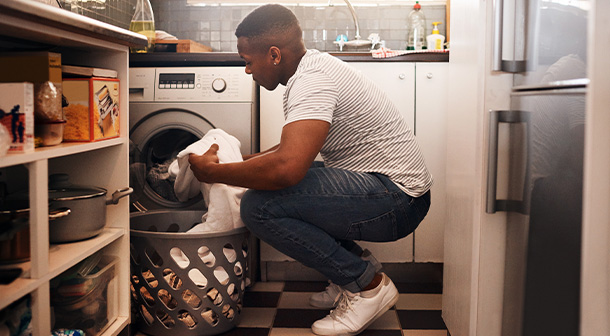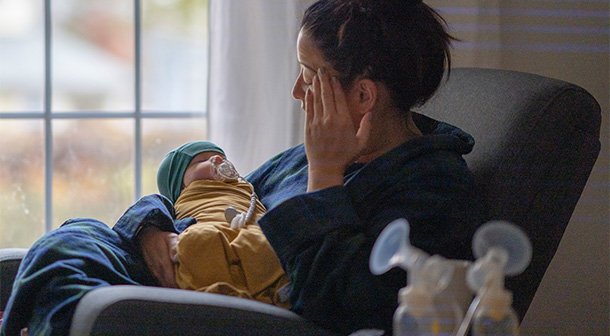Congratulations on your new baby! Having a baby means big changes for everyone, and your partner and family are going to need you more than ever during this exciting (and exhausting) time. Not only are you adapting to a new normal, but there's so much to learn! For example, you might not have known about the benefits of breastfeeding, and that every ounce of breastmilk your baby gets is a wonderful gift that can impact his (or her) growth and development. While you might not be able to breastfeed, giving your partner breastfeeding support is one of the best gifts you can give to your baby. Having a supportive partner helps moms breastfeed longer, which means your baby will get more of the benefits of breastfeeding.

The Benefits of Breastfeeding
Breastfeeding is good for babies
Breastfeeding provides more than just nutrition. Mom's first milk, colostrum, is often called "liquid gold" because it provides antibodies that help your baby stay healthy. Studies show that breastfed babies get sick less often and have fewer ear infections, respiratory infections, and incidence of childhood cancer. Breastfed babies also have a 36% lower risk of Sudden Infant Death Syndrome (SIDS).
As babies grow up, breastfeeding helps protect them against things like childhood leukemia as well as diabetes, obesity, and hypertension. These health benefits increase with every ounce of breastmilk your baby drinks. Breastfeeding has even been shown to make children smarter: breastfed babies have higher IQs and do better in school. Breastmilk is some powerful stuff!
How does breastmilk do so much? A mother's body makes breastmilk specifically for her baby. And the breastmilk changes over time to meet the baby's changing needs. Breastmilk even changes from the beginning of a feeding to the end of a feeding! The proteins in breastmilk are much easier on a baby's stomach, so breastfed babies are less likely to have gas, constipation, or colic. And that makes everyone happier.
Good to Know: What is colic?
All babies cry, but when a healthy baby cries a lot for no reason it's called colic. Colic is most common during a baby's first 6 weeks. It normally goes away on its own by the time babies are 3 to 4 months old. If you think your baby may have colic, talk to your pediatrician.

Breastfeeding is good for moms
Moms get benefits of breastfeeding, too. To start with, there are proven long-term health benefits: breastfeeding lowers a mother's risk of breast and ovarian cancer, heart disease, and diabetes. Breastfeeding also burns up to 600 calories a day, and it causes contractions that help the uterus to shrink back down to its pre-pregnancy size, which can help moms to recover more quickly after giving birth.
There are also emotional benefits of breastfeeding. Breastfeeding releases hormones that help moms relax and bond with their baby. And, moms get more sleep when they don't have to wake up to prepare or warm bottles for nighttime feedings.
There are financial benefits related to breastfeeding too. Breastfeeding for one month can save between $75 and $200 on formula costs. Over a year, that adds up to $900–$2,400 in savings.

How to Support Your Partner
Providing breastfeeding support
Breastfeeding is a wonderful experience, but it can also be hard. Your partner may need you to provide breastfeeding support and encouragement to keep going. There are a lot of practical ways you can help.
Start early
Your breastfeeding support can start before your baby even gets here. Join mom when she discusses breastfeeding with her healthcare team. If you can, find out what breastfeeding support will be available at the hospital or birthing center. Many places have a lactation consultant available to answer questions and help with positioning and latch.
You can also be a strong advocate for skin-to-skin time and breastfeeding during the first hour after birth, a time that's often called the “Sacred Hour.” During skin-to-skin time, baby is placed on mom's chest for snuggling and breastfeeding mom's first milk, that nutrient-rich colostrum. Studies have shown that skin-to-skin time during this first hour of baby's life helps to get breastfeeding off to a good start. Even babies delivered by a c-section (cesarean) should have skin-to-skin time offered to them. Skin-to-skin time isn't just for moms, either - it's for dads or partners too and helps with bonding. During this hospital time and later, get lots of skin-to-skin time where you cuddle your baby on your bare chest.
Another important job you can do at the hospital is to help limit visitors to ensure your partner and baby are getting enough rest and breastfeeding time. While it's lovely that friends and family want to meet your new baby, these early days are special. This is the time for you and your partner to get to know your little one - and to get breastfeeding off to a good start. That can be hard to do if visitors are constantly coming into the room. Find out mom's preference on how she would like you to help manage visitors. It might be best to encourage visits once mom and baby are settled in at home.

Once you're home
When it comes to keeping everyone in your household rested, fed, and clean, dads and partners are the real heroes.
Keep the family fed
While mom recovers, you can head up the cooking and grocery shopping. Keep any older children on track with regular meals and snacks. Make sure mom always has a water bottle nearby as well as nutritious snacks like fresh fruit, cheese and crackers, or peanut butter toast.
Watch for hunger cues
Help mom watch for early baby's hunger cues. A hungry baby is often an upset baby, and it's easier to get babies to latch before they start crying (a late hunger cue). Baby's early hunger cues include lip-smacking, nuzzling or searching for the breast, moving their hands to their mouth, and making sucking motions.
Rest, rest, rest
Make sure mom has time to recover and sleep as much as she can. Try to keep things quiet and calm around the house as you're finding your new routines. Spend time playing with older children and handling things like baths, bedtime routines, homework, and school drop-offs when possible. Take care of household chores, and coordinate with any guests who want to come over to meet the new baby. Don't be afraid to ask someone to come by at a later time.
Be on milk duty
If mom is using a breast pump, you can help with freezing and storing the milk after she pumps. There are special small bags for storing breastmilk safely in the freezer. You can label each bag with the date it was pumped. Breastmilk normally lasts 6 months in the freezer, but up to 12 months is acceptable. After breastfeeding is established, you can even give your baby a bottle of pumped breastmilk to give mom a break, or bottle feed at night while mom pumps. Offer to handle burping, diaper changes, and getting baby back to sleep after breastfeeding. All of this can help mom get some extra, much needed, rest.
Stand up for breastfeeding
Let your partner know you have her back. Don't be shy about sharing the benefits of breastfeeding with your friends and family. Let them know how proud you are of your partner for giving your baby the gift of breastmilk. You can also do what you can to help mom feel comfortable feeding your baby wherever she wants, even if mom and baby are out in public. You can sit with her, or just provide moral support. While she might feel nervous the first few times, it gets easier with practice. By the way, Texas law supports a mother's right to breastfeed her baby anywhere.

Need parenting help now?
The Texas Parent Helpline is available 24/7.
- Call 833-680-0611
- Chat with us
- Text 833-680-0611
Going back to work
Many moms get overwhelmed when they think about going back to work after maternity leave. It can be a very emotional time for everyone. Pumping and bottle-feeding breastmilk is a powerful way for moms to stay connected to their babies while they are apart during the day and maintain breastfeeding. You can help your partner prepare so she feels good about breastfeeding, even after she returns to work. Here are some ways to help:
Help make a plan for going back to work
When mom is still on maternity leave, help her plan the transition back to work. Moms can often get a free or low-cost breast pump through their health insurance plan or from a local WIC clinic. She will need to make a schedule so she's pumping breastmilk for each time she would normally feed her baby during the day. Help her think through when and where she could pump at work, and who she needs to talk to at her job. Will she store the pumped breastmilk in a fridge, or in a small cooler with ice packs? Remind her what an amazing job she's doing, and how pumping breastmilk will help her feel close to her baby during the workday.
Help your partner so she's ready to talk to her employer about pumping at work. She can talk with them about what she needs and where she can pump. If needed, she should be prepared to explain the benefits of breastfeeding for moms and babies and why it's important for her. And a bonus - since breastfed babies get sick less often, so moms will miss less work. Remember, the law says employers must give mothers break time and a private place to pump.
Be her cheerleader
The most important thing you can do is offer your support and encouragement. Tell your partner what a great job she's doing and remind her that it will get easier with time. Transitions are hard, but she'll get the hang of it! Encourage your partner to spend as much time as possible with your baby when she's not working, and to get extra sleep when she can. Doing these things will help her keep up her milk supply.

You've got this, Dad!
If your partner needs breastfeeding help, you don't have to figure it out alone. There are lots of free and low-cost resources available to help your family with breastfeeding support. You can be the one to do research and help mom reach out to a lactation consultant, peer counselor, or local Texas WIC clinic for breastfeeding help.
While this time with your new little one is very special, it can be challenging for you, too. Don't be afraid to ask friends and family for help. They can do things like help with older kids, meals, and errands or chores. It's also a good idea to connect with other dads and partners who have children the same age or who have gone through these experiences already. You can talk to family members with babies and other parents for advice about how they support breastfeeding and manage with a new baby in the house.
Don't forget, it's not just mom that's doing a great job - you are, too! Dads and partners play a key role in keeping the household running and taking care of everyone. And that's a really big job!




